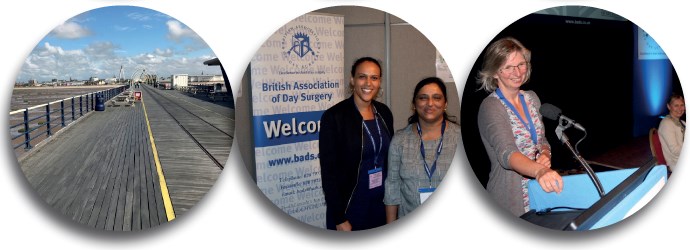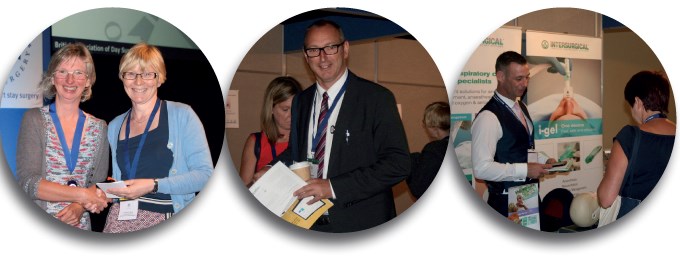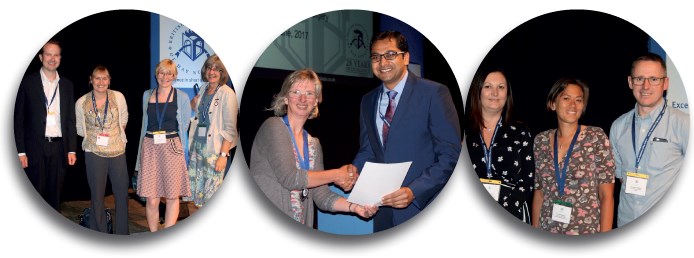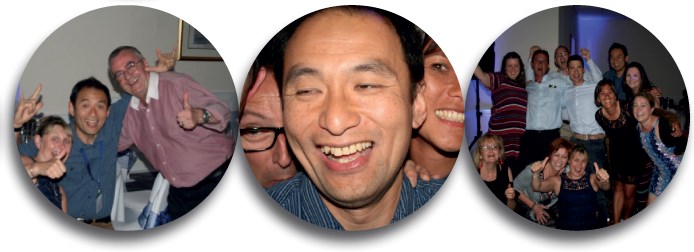Reflections of the 2017 ASM Southport « Contents

Paul Rawling
Your council team arrived on Wednesday prior to the opening of the Annual Scientific Meeting (ASM). The weather was pleasantly warm in Southport, the venue for our ASM for the 3rd time. A preview inspection of the venue was good and highlighted the bright, open spaces and excellent accessibility we had for the ASM this year. I was a little apprehensive this year as it had felt more difficult to mobilise the membership in the build up toward the ASM which is the major event we hold each year.

Day 1
After the official opening of the ASM by the President of BADS Dr Mary Stocker providing a very warm welcome to all the speakers and delegates the ASM was under way and immediately in full swing. Numbers of delegates were at a lower level this year than previously, which I personally was disappointed with, especially with the exceptional programme of speakers and workshops on offer this year. However the delegates who attended really privileged and were provided with a treat with the speakers within the programme providing some excellent discussion areas for the rest of the ASM and beyond. I continue to have discussions about the topic areas discussed over the 2 days. The enthusiasm of those in attendance was extremely pleasing for all the council members to see, as was the fact we had the opportunity to meet up with old friends and see so many new faces whom I hope feel engaged enough to submit an abstract or a poster of their great work for next years event in the fabulous city of Sheffield.
Following the introductions from Dr. Mary Stocker (President) and brief housekeeping notes from Paul Rawling (Honorary Secretary) we were straight into the first plenary session of the conference. The presentation of the European fasting guidelines for surgery which although not new still appear to be a secret from most of us despite being endorsed by the college of anaesthetists and AAGBI. These guidelines were delivered in 2011. Dr. Stocker was one of our speakers in this session and started that the guidelines had 'transformed my practice in the past 12 months’. As an experienced consultant Anaesthetist this is a powerful statement and is not to be taken lightly. It was also of benefit to hear of the work carried out in Torbay by Dr Mike Swart whose work developing high risk assessment clinics and shared decision making is well renowned and has been found to be extremely beneficial to patients.
Each year at BADS ASM we try to showcase a particular surgical specialty which is pushing previously unthinkable boundaries of day surgery. This year we were delighted to welcome a very special team from Southampton, Mr Paul Grundy and Dr Crispin Weidmann who shared their experiences of delivering a day surgical neurosurgery service. I have worked, in Operating Theatres, in Education as a lecturer and have spoken both nationally and internationally at conferences. This session left me nothing short of speechless, which I can assure you, does not happen often. I never imagined in my 38 years of experience in healthcare that I would hear the terms neurosurgery and day surgery mentioned in the same sentence. As our President suggested ‘Yes it can be done’. There is some fantastic work carried out all the UK everyday which leaves me in awe of my ultra talented colleagues. This for me was astonishing and a fantastic move forward within the day surgery speciality.
Following up on the previous sessions we have known for many years that good IT systems can help transform day surgery services and the team from Chester, Professor Paul Edwards and Dr Steven Moore shared their experiences with us. The overarching message from this session was the sharing of information in a logical and efficient manner. Clearly this is not effective enough in some areas. The current issues in healthcare informatics were discussed at length and included all the issues that appear relevant to all clinical practice at the moment. These areas included access to shared data, which was hoped to be dealt with with a computer system installed across the NHS and beyond, the role of the CCIO in clinical practice, the findings of the Wachter Report, standards in clinical correspondence as recommended by the Academy of Royal Colleges, clinical coding standards, tracking of patients and equipment and STPs and the link to informatics development across their footprints. Standardisation and sharing is the overarching key to success.
The free paper session is a very good way for all staff who wish to present their own or colleagues work from practice, in a relatively non-threatening environment. A variety of topic areas were presented this year including Mastectomy surgery, Day case Paediatric Tonsillectomy, Management of Abscesses using the ambulatory care abscess pathway, the implications of unplanned admissions in stand-alone units, the re-audit of unplanned admissions and the diagnosis of serious co-morbidities at pre-operative assessment. I would encourage members and non-members alike to work together and have a go at submitting an abstract or producing a poster. These are really good ways of getting your work recognised and even published in the Journal of One Day Surgery and will enhance any CV. The second free paper session was again well attended and had a really strong clinical feel about it. The sessions were again varied and included TURP Safety, cost benefit and patient satisfaction, the consenting process for elective inguinal hernia and the question of are we doing it right? The implementation of a protocol led anaesthetic approach to reduce day case gynaecological surgery failure rate, Hand and Wrist Day Surgery – Dream or Disaster? Unplanned admissions on a split site trust: The difference a day surgery unit makes and finally An Audit of Unplanned Admissions Following Arthroscopic Shoulder Surgery. I have an interest in the free papers as I believe publishing of work is vital to move the speciality forward and new writers are required all the time. The JODS Editor is awaiting your papers. Please do not let him down. The papers were well written and well delivered and essentially kept to the time allocated for each paper. These are skills which are learned and are transferrable and are worth having in your personal armoury.
This year there were 4 workshops planned during the conference. Each one was very well attended which I was delighted with. I am sure every delegate came away with some information and discussion of benefit to their practice, which could be fed back to teams and if possible implemented in practice. The workshops included Training in Day Case Surgery: Dilemmas and Tips with Mr. Dave Bunting, Miss Emma Court and Dr Teresa Hind, Sending patients home with Local Anaesthetic infusions with Dr. Robert Erskine, Day Case Breast Surgery with Mr. Kian Chin and Nursing Dilemmas in Day Surgery: An MDT Discussion with Ms Fiona Belfield and Mr. Paul Rawling. Being personally involved in the latter workshop I can say it was excellent, a great deal of discussion took place around a variety of issues, which were predominantly common amongst all in attendance. Standardised processes, outlier activity, discharge criteria, staggered admissions and staffing of day surgery departments. Yes a variety of issues, but common to most of us in the room. I was encouraged with the attendance and the multidisciplinary mix within the delegates in the session. This was also demonstrated across all the other workshops.
This year saw a reduced number of high quality posters accepted and they were all professionally formatted and beautifully produced. The posters were popular during breaks and lunch periods and did get a lot of views and I spoke with a number of presenters and onlookers during the break periods and the feedback was largely positive. The topic areas were numerous and included Laparoscopic Cholecystectomy and surgical outcomes, Solving the consent problem, Post-Operative Pain Relief after discharge, Audit of recording of HBA1C, BMI and BP in Primary Care, Pre-operative fasting, Paediatric Tonsillectomy, Audit of ACL reconstruction, Mastectomy, Post-Operative patient reported outcomes, Increasing Laparoscopic Cholecystectomy rates and Streamlining emergency ureteric colic management. I have never produced a poster and I always admire the skill required to do so, in selecting what to include and what to leave out. Well done to everyone who took part and congratulations to those who received a Gold, Silver or Bronze certificate. Again a great way to get your work published and viewed by colleagues and friends which is a step in the right direction for our professions and for you personally.

The Annual General Meeting indicated the end of day one of the ASM. A good number of members attended this meeting. Council members with officer roles provided there brief annual reports to the meeting including the treasurer, honorary secretary and publications officer. A small number of resolutions were put forward, voted on and passed at this meeting. Following the AGM everyone went away to prepare for the Networking Dinner. This was a standout event and everyone enjoyed the occasion, well attended and well behaved and an excellent way for networking to take place. The food and drink were excellent and this proved to be a very pleasant social event for all.
Day 2
The day saw a plenary session around Ambulatory Emergency Care from Dr. Vincent Connelly, Deborah Thompson and Darren Leech. The team from NHS Elect delivered some thought provoking discussion worthy of further consideration. The session included a variety of people issues and process matters, as well as a practical guide to optimizing the clinical working environment to encourage the Day surgery emergency care process to develop locally and flourish. A lot was said in 2016 at the ASM about emergency care in day surgery and yes it can be done, but requires specific management and processes to be in place. I enjoyed the session and found that the issues are not insurmountable at all some of us just think they are as we have not considered them previously.
The prize paper presentations are always hotly contested and 2017 was no exception. The diversity of these presentations is a joy to behold and demonstrates that Day Surgery is at the cutting edge (excuse the pun) of current surgical care. The topic areas were very much forward thinking and included Patient satisfaction with being cared for by Physicians Assistants (Anaesthesia), Paediatric Urology Day Case Surgery: A 5 year closed loop audit of length of stay, Can Regional Anaesthesia facilitate day case Mastectomy surgery? A quality improvement project, Does Intra-operative Cholangiography reduce the 28 day readmission rate following Day Case Laparoscopic Cholecystectomy, Reconfiguration of Anaesthetic Services at a Short Stay Satellite Unit to support and help relieve winter pressures and The Effect of Pre-Operative Pain on Day Surgery Outcomes. For me the delegates who, work on, write and present these prize papers are all winners in my eyes. Your work is on view for discussion and I am always grateful for your efforts and diligence with this work. You are all to be commended and especially the prize winners.

The next session was again interesting, thought provoking and a very real issue which started more debate between the delegates. The Post-Operative Carer: An Absolute or Relative Necessity? Drs Rachel Morris and Johannas Ratief were eloquent in their arguments and discussions. I had not previously considered this as an issue it was a proverbial ‘done deal’ for me but perhaps not anymore. Do fit and well patients require an inpatient bed due to not having a carer available at home? Social care and health care perhaps require further links but that is another discussion for another event. Over the years patients have been telephoned 24 hours post-operatively and have not answered. It is suspected some were out and about perhaps even shopping and taking part in their normal daily routine. Perhaps no need for a carer for 24 hours. That said I have my own views in relation to the more complex surgery now being managed on a day case basis. Indeed a cost saving could be had here. However what price safety? That said I am not sure that I would require a carer for 24 hours post-surgery, dependent upon the type and complexity of the surgery I required. Interesting and continuing debate for another day and perhaps a future ASM.
Final session of the 2017 ASM was no less thought provoking and outstanding. Delivering a day Case Spinal Anaesthesia Service is an area to develop throughout day surgery. Drs Robert Erskine and Kim Russon and Ms Debbie Timms Day Surgery Matron. The session included Targeting your day case spinal to the surgical procedure, How to introduce the service to your Day Surgery Unit and What are the Matrons Dilemmas. The issues discussed were clear, how do you get this implemented in to practice? Choosing the key personnel who need to be convinced and won over, Surgeons, Anaesthetists, Managers, All day Unit Staff. How is this done? how long will it take? Targeting patients is also crucial to the effe3ctiveness of short acting spinal anaesthesia as is trust between the surgical and anaesthetic teams. This session was a terrific way to close the 2017 BADS ASM in Southport with yet more food for thought. I have no idea how I will process all the new ideas I have come away with.
My final thoughts are that the 2017 BADS ASM in Southport has been a great success, stimulating, eye opening, progressive and reflexive. I am astounded at the brilliant work taking place throughout the country and how many patients are benefitting from your knowledge and skill. I am eternally grateful to our speakers this year who have given us there time and effort. It was great to meet up with colleagues and friends again this year and to discuss current issues that everyone appear to be experiencing in difficult fiscal times in the NHS and the wider community. Finally with everything else said and we are all back at the clinical interface, caring for our patients and carers, I would just like to say I would be delighted to see you all in 2018 at the ASM in Sheffield.

Cite this article as https://daysurgeryuk.net/en/resources/journal-of-one-day-surgery/?u=/2017-journal/jods-273-2017/reflections-of-the-2017-asm-southport/
Download this article as PDF here: https://appconnect.daysurgeryuk.net/media/6165/273-reflections.pdf